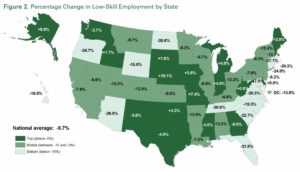OK, I was wrong (sort of). Now I’m fessing up. So, get over it.
While the labor market has deteriorated markedly since the onset of the Great Recession, job losses for low-skilled workers have been especially devastating. And nowhere in the country (literally, nowhere, except in Tennessee) have low-skilled workers been more likely to lose jobs than in Virginia. According to the calculations of the Urban Institute’s Josh Mitchell in “Where It Really Hurts,” Virginia lost 2.7% of its jobs between 2007 and 2010/2011. But the number of low-skilled job declined 28.3%! That compares to a national average of a 9.7% decline in low-skilled jobs.
Let me be the first to say (before anyone obnoxiously points it out to me) that this data is consistent with the claim made by the Commonwealth Institute, which I dissed a couple of days back in “Virginia’s Skewed Prosperity,” that the wage gap in Virginia has been getting worse. In “Unbalanced, Unequal and Undercut,” CI argued that highly educated workers have prospered while job losses in middle-wage industries have hurt employment opportunities for middle-class Virginians.
The Urban Institute data supports CI’s assertion that employment in low wage occupations in Virginia has been clobbered and that the gap between high- and low-wage workers continues to grow. I still maintain, as I did in my review, that the statewide wage gap is exaggerated by the growth in population and incomes in Northern Virginia, thus obscuring economic dynamics within individual metropolitan areas. But I repent for saying that the CI study created “a terribly misleading impression.” Overall, CI got it right.
— JAB



